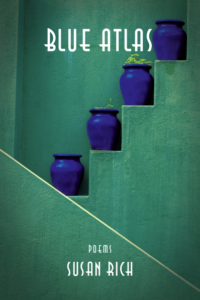 Review by Mary Ellen Talley
Review by Mary Ellen Talley
Susan Rich demonstrates her command of poetic imagery and manuscript crafting in her sixth collection, Blue Atlas. The title refers to the resilient blue-green tipped cedar tree that is native to North Africa.
“Hourglass,” the first of seven sections, sets the scene for poems about a resilient young woman. The poem, “This Could Happen,” (15) reimagines with the conditional, “If you kept walking out of the self // you could begin again as sea water, as spindrift.”
In the first of seven sections, the poem, “Post-Abortion Questionnaire Powered by Survey Monkey,” (18) demonstrates Rich’s talent for leading us on a metaphorical path and scattering narrative crumbs like a Gretel. The survey asks:
9. Did your relationship to, or concept of, “God,” or “Karma,” or “Fate”/ change after your abortion?
my own voice falters, tell them
I tried not to live inside the clock
or under the skin of pomegranates.
Does anyone escape her own story—
Free verse poems in couplets, tercets, broken tercets with separated single lines, as well as modern sonnets, sparkle throughout the collection. In “Mrs. Potato Head,” (29) arranged in staggered tercets, the speaker recalls a toy made in girlhood from an orange as the poem also hints at her early concerns for the world at large:
toothpick legs, and blue magic
marker boots. We didn’t need maps
or mirrors to find a way out of the echo
chamber of childhood—just
a vegetable and a fruit repurposed
for two Jewish girls in a basement
trying with spells and with death-
defying persistence
to reshape the afternoon news.
Rich creates deft connections between and among poems. Compare the above with its subsequent poem, “Fever,” (30) which refers metaphorically to citrus fruit. “The world closed-up around her / like a tangerine and she was the pith.”
Poems in this collection speak of wanderlust. They offer a picturesque travelogue of adventures abroad, including France, the Saharan Desert, and the High Atlas mountain range in Morocco. Rich herself has worked abroad in the field of human rights in venues such as Amnesty International and The Peace Corps.
In the poem, “Self Portrait with Market Man,” (46) the speaker casts our attention upon “small onions and green mangoes,” shawled women with “bodies / odd-shaped lemons next to pyramids of ill-gotten jeans.” The poem moves to a young woman letting down her guard, followed with an implied deception while describing the scene to “you, // dear unfaithful lover,” a man who “would later lift the blue / scarf from my almost gorgeous life.” The lines become personal while suggesting a deeper narrative.
Rich creates levels of imagery that introduce a cinematic mise-en-scène.
One of Rich’s many strengths is in her ability to use details lyrically and metaphorically to take us within a setting as if she is projecting a film. The poem, “Medina, Morning,” (78) is adorned with “herbalists, spice merchants, motorcyclists // and a clowder of orange cats,” with “soap mixed from camel milk and night-blooming jasmine.” We are awash in scent and color.
Midway through Blue Atlas, a poem is titled “Boketto,” (55) a Japanese word implying to gaze vacantly into the distance. Rich begins with an enigmatic couplet, “Outside my window it’s never the same— / some mornings jasmine slaps the house, some mornings sorrow.” The speaker has transitioned from reimagining the hypothetical to accepting uncertainty. “Someone should #hashtag / a word for the ashes of an almost marriage.”
It is intriguing to take note of titles as this poem is preceded by the poem, “Wedding Dress,” (51) that alludes to a beautiful blue dress now “sequestered in the back of the closet.” She asks, “Who was the girl locked inside the alchemical stitch— / soon to create such a symphonic mess of it—.” She was like many girls everywhere, an almost bride and mother.
As this collection suggests a timeline while it weaves an emotional arc, the speaker rises toward acceptance and exploration. Past becomes artifact.
The poems in Susan Rich’s Blue Atlas present vivid imagery that open exotic windows to young adult romantic exploration, choices, and controversial challenges that have repercussions through a lifetime. This gorgeous, brave, and lyrical collection is a must-read for feminists and lovers of the lyric word.
Blue Atlas by Susan Rich
Red Hen Press, 2024, $17.95 [paper]
ISBN: 9781636281261
Mary Ellen Talley has published two poetry chapbooks, Postcards from the Lilac City and Taking Leave. She has had reviews published in Crab Creek Review, Asheville Poetry Review, and Mom Egg Review, among others.
